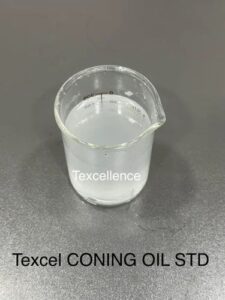Texcel Coning STD Texturing Yarn Antistatic Lubricating Oil
Product Description
Texcel Coning STD Texturing Yarn Antistatic Lubricating Oil is a specialized lubricant designed for the textile industry, particularly for the processing of synthetic fibers. This high-performance oil is formulated to reduce friction and static electricity during the texturing and coning processes, ensuring smooth operation and high-quality yarn production. Its unique blend of additives provides excellent lubrication, enhances the durability of machinery, and improves the overall efficiency of textile operations.
Uses
- Textile Processing: Ideal for use in the texturing and coning of synthetic yarns, ensuring smooth operation and reducing wear on machinery.
- Static Control: Effectively minimizes static electricity buildup, which can lead to yarn breakage and operational disruptions.
- Lubrication: Provides superior lubrication to machinery components, extending their lifespan and reducing maintenance costs.
- Compatibility: Suitable for a wide range of synthetic fibers, including polyester, nylon, and polypropylene.
Technical Data
| Property | Specification |
|---|---|
| Appearance | Clear, pale yellow liquid |
| Viscosity (at 40°C) | 30-40 cSt |
| Density (at 20°C) | 0.85-0.90 g/cm³ |
| Flash Point | > 200°C |
| Pour Point | -15°C |
| Antistatic Properties | Yes |
| Recommended Dosage | 0.5-2.0% (based on fiber weight) |
| Shelf Life | 24 months (when stored properly) |
Key Features
- Enhanced Performance: Reduces friction and wear, leading to improved machine efficiency.
- Antistatic Properties: Prevents static charge accumulation, ensuring a safer working environment.
- Versatile Application: Compatible with various synthetic fibers, making it a versatile choice for textile manufacturers.
- Cost-Effective: Reduces maintenance and operational costs by prolonging the life of machinery.
Conclusion
Texcel Coning STD Texturing Yarn Antistatic Lubricating Oil is an essential product for textile manufacturers looking to enhance their production processes. With its superior lubrication and antistatic properties, it not only improves the quality of the yarn produced but also contributes to the longevity of the machinery used in the textile industry.

